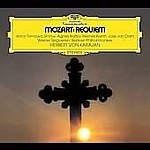Herbert von Karajan’s 1975 Mozart Requiem is of the grand ceremonial type with large choral forces and full orchestra accompaniment–all of which sounds quite massive compared to more recent period-style performances–particularly Bruno Weil’s powerfully lean and incisive version on Sony (see Reviews Archive). The present recording’s spacious reverberation enhances the feeling of bigness, and with it the sense of occasion. Karajan’s tempos are on the slow side, especially by today’s standards, but he generates much anger and sonic power in the Dies Irae. But the tension flags considerably in the second half, where Süssmayr reportedly takes over (this recording uses the standard Süssmayr completion). However, there’s no lack of passion on the part of the singers, especially Jose van Dam, whose golden bass-baritone sounds so soothing in the Tuba Mirum.
Karajan is dutifully reverential in the coupled Mass in C, but even though he again gets fine choral and solo singing (and the recording is closer and brighter than the Requiem), the performance could do with a lighter, more joyful touch. Ultimately it comes down to whether you are a Karajan fan, in which case this recording does the job. For others, there are the recommended alternatives.
































